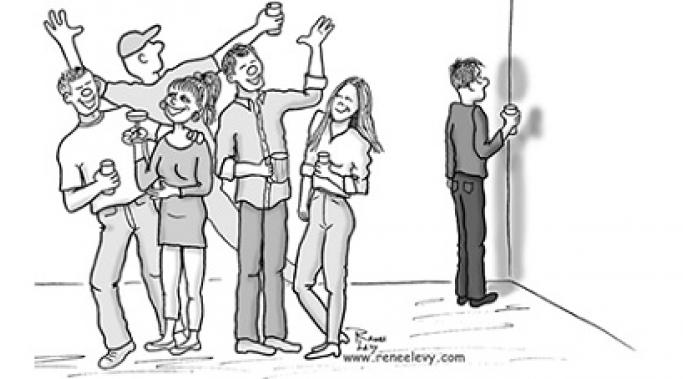There are a lot of catch-22s when it comes to managing anxiety. For example, many people with anxiety would feel a lot better if they could avoid anxiety triggers altogether. It is simple to say, but harder to do. Avoiding anxiety triggers isn't always possible. Another common suggestion is to join a support group. But what if a person has too much anxiety to join a support group?
Effects of Anxiety
Imagine yourself at a gathering. Big or small, it doesn’t matter (because with anxiety, even the smallest things can seem gigantic). Perhaps it’s a family get-together, coffee with acquaintances, a meeting, or a pancake feed for your kids’ school. You’re there, others are there, and your anxiety is there. How do you feel?
There are many pitfalls to being a person living with an anxiety disorder. The mental, physical, and emotional tolls that it takes to live with this disorder is, at times, heartbreaking. Anxiety tells me everyone hates me, it panics me, and it embarrasses me. In the midst of high anxiety and/or panic attacks, it causes me to appear distant, uninterested, or even makes me appear to be ignoring someone. An ill-timed panic attack, for example, at a first meeting, can make it appear that I am a snob.
I have experienced more panic attacks than I can count. On average, I have one panic attack per week, and that is after panic attack treatment. Before I knew what was happening to me, I was experiencing panic attacks multiple times per week. Because I am a social person, I often experience these attacks around other people. This has made me very good at explaining, in layman’s terms, exactly what a panic attack is.
A diagnosis of generalized anxiety disorder (GAD) or having panic attacks doesn’t automatically mean there will be a co-occurring diagnosis of depression. However, many people with an anxiety diagnosis do suffer from clinical depression, even if only from time-to-time. In my case, I have both bipolar and anxiety disorders. Like many others, I have found that serious anxiety can lead to depression.
Mental Illness Awareness Week 2014 continues. The week means slightly different things to different people (as in specific awareness, the attitude behind the desire for awareness, etc.) To me, it means something relatively simple. It means looking at people in a new way, leading to a new understanding of them as human beings. Mental illness happens to be part, just part, of who they/we are. Awareness of the whole package brings understanding of the whole person.
As of this writing, I live with my wife. But before I lived with her, I had a variety living situations, including living alone and with a roommate. Anxiety and panic attacks occurring at home are fairly common for many of us with anxiety disorders and disorders don’t much care what your personal living situation is.
Panic and anxiety attacks in public present a special kind of frustration because, in addition to the attack, we have to deal with the embarrassment of being sick in public. Even during my worst panic attack in a public forum, I was still concerned with what others thought of me and whether or not they were judging me.
Most everyone engages in conversation daily. From talking to the members of our household, to answering the phone, to ordering our coffees in the morning – talking to those around us occurs often.
One doesn't need to have an anxiety disorder to know that certain conversations provoke a sense of discomfort or even dread. Arguing with a loved one, consoling someone at a funeral, or even telling someone “no” can cause anyone anxiety.
This, of course, makes us wonder: if it is reasonable that certain conversations or subjects cause most people anxiety, what does it do to a person with an anxiety disorder?
Over the weekend, my wife was bitten by a dog. It was a serious bite, costing her the tip of her right index finger. I was present when it happened, watching in horror as she stepped in between two angry lab-mixes that were fighting over a bone.
We went from watching college football to panic in less than 30 seconds. As my wife sat down, holding her bloody hand, there wasn't time to think about much. My only concern was how to help her. My mother-in-law had separated the dogs, placing one in a cage, and raced over with napkins and began to apply pressure to my wife’s wound. At that moment, we had no idea how serious the injury was.
Anxiety can feel as though an incredibly loud and boisterous parade is charging right through your very being: blasting bands, flashy floats, animals, and announcers ad nauseam. This chaos within can cause headaches, chest pain, difficulty breathing, excessive sweating, aches and pains, and other noxious anxiety symptoms. Further, our thoughts become anxious and race with worry and obsessions. Often, panic sets in. As if this weren't bad enough, we have to live in the midst of this parade. We have to deal with parade garbage (think about it—debris, litter, road apples) while simultaneously dealing with everything else around us. With pandemonium on the inside, how do we deal with all of the stuff on the outside?









